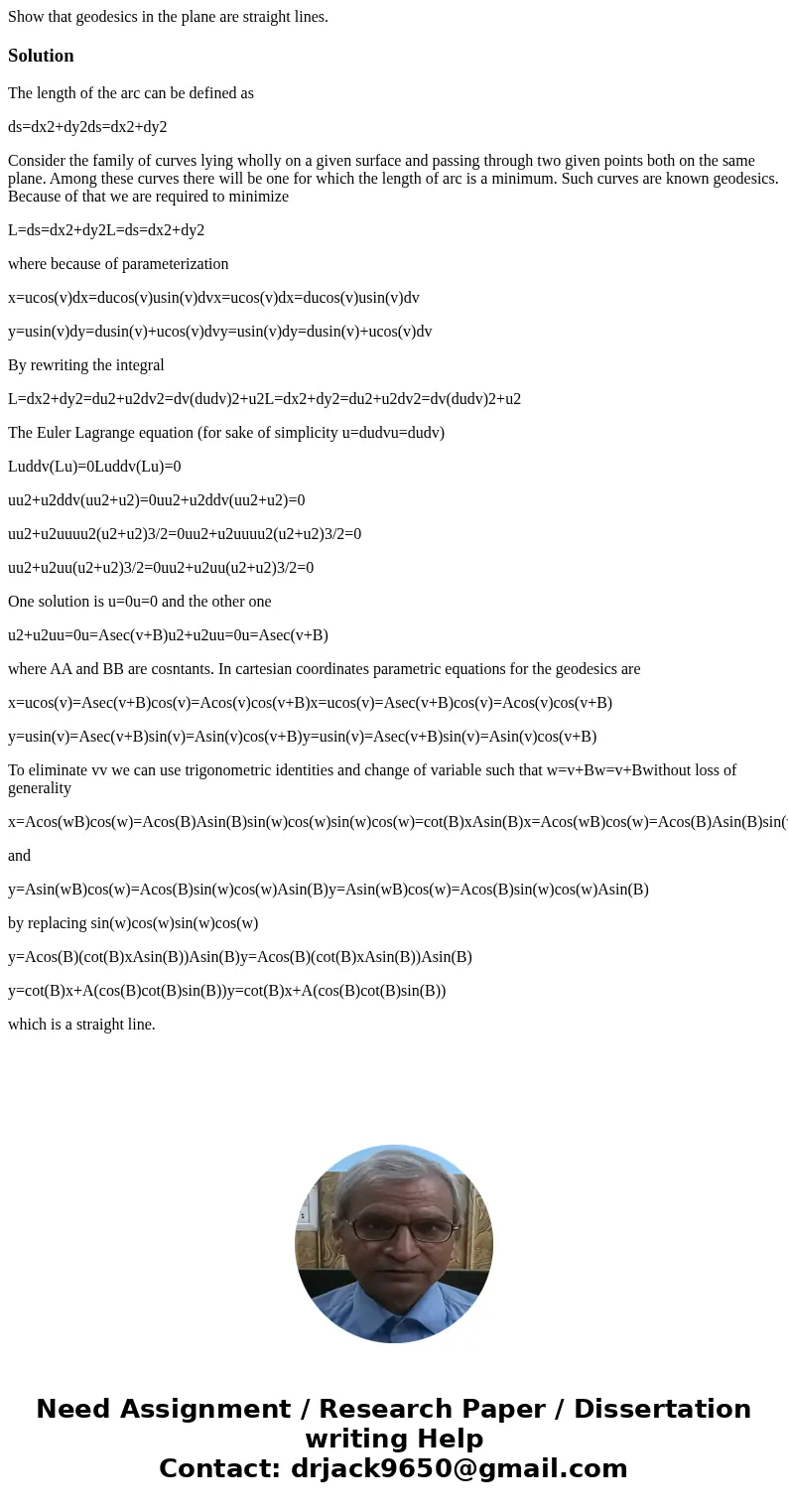Show that geodesics in the plane are straight linesSolutionT
Solution
The length of the arc can be defined as
ds=dx2+dy2ds=dx2+dy2
Consider the family of curves lying wholly on a given surface and passing through two given points both on the same plane. Among these curves there will be one for which the length of arc is a minimum. Such curves are known geodesics. Because of that we are required to minimize
L=ds=dx2+dy2L=ds=dx2+dy2
where because of parameterization
x=ucos(v)dx=ducos(v)usin(v)dvx=ucos(v)dx=ducos(v)usin(v)dv
y=usin(v)dy=dusin(v)+ucos(v)dvy=usin(v)dy=dusin(v)+ucos(v)dv
By rewriting the integral
L=dx2+dy2=du2+u2dv2=dv(dudv)2+u2L=dx2+dy2=du2+u2dv2=dv(dudv)2+u2
The Euler Lagrange equation (for sake of simplicity u=dudvu=dudv)
Luddv(Lu)=0Luddv(Lu)=0
uu2+u2ddv(uu2+u2)=0uu2+u2ddv(uu2+u2)=0
uu2+u2uuuu2(u2+u2)3/2=0uu2+u2uuuu2(u2+u2)3/2=0
uu2+u2uu(u2+u2)3/2=0uu2+u2uu(u2+u2)3/2=0
One solution is u=0u=0 and the other one
u2+u2uu=0u=Asec(v+B)u2+u2uu=0u=Asec(v+B)
where AA and BB are cosntants. In cartesian coordinates parametric equations for the geodesics are
x=ucos(v)=Asec(v+B)cos(v)=Acos(v)cos(v+B)x=ucos(v)=Asec(v+B)cos(v)=Acos(v)cos(v+B)
y=usin(v)=Asec(v+B)sin(v)=Asin(v)cos(v+B)y=usin(v)=Asec(v+B)sin(v)=Asin(v)cos(v+B)
To eliminate vv we can use trigonometric identities and change of variable such that w=v+Bw=v+Bwithout loss of generality
x=Acos(wB)cos(w)=Acos(B)Asin(B)sin(w)cos(w)sin(w)cos(w)=cot(B)xAsin(B)x=Acos(wB)cos(w)=Acos(B)Asin(B)sin(w)cos(w)sin(w)cos(w)=cot(B)xAsin(B)
and
y=Asin(wB)cos(w)=Acos(B)sin(w)cos(w)Asin(B)y=Asin(wB)cos(w)=Acos(B)sin(w)cos(w)Asin(B)
by replacing sin(w)cos(w)sin(w)cos(w)
y=Acos(B)(cot(B)xAsin(B))Asin(B)y=Acos(B)(cot(B)xAsin(B))Asin(B)
y=cot(B)x+A(cos(B)cot(B)sin(B))y=cot(B)x+A(cos(B)cot(B)sin(B))
which is a straight line.

 Homework Sourse
Homework Sourse